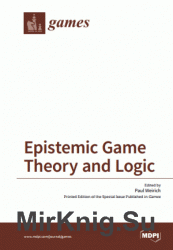Epistemic Game Theory and Logic
- Добавил: Semka
- Дата: 6-12-2018, 18:20
- Комментариев: 0

Название: Epistemic Game Theory and Logic
Автор: Paul Weirich (Ed,)
Издательство: MDPI
Год: 2017
Формат: pdf
Страниц: 190
Размер: 2.5 mb.
Язык: English
Epistemic game theory and the systems of logic that support it are crucial for understanding rational behavior in interactive situations in which the outcome for an agent depends, not just on her own behavior, but also on the behavior of those with whom she is interacting. Scholars in many fields study such interactive situations, that is, games of strategy.
Epistemic game theory presents the epistemic foundations of a game’s solution, taken as a combination of strategies, one for each player in the game, such that each strategy is rational given the combination. It considers the beliefs of the players in a game and shows how, along with the players’ goals, their beliefs guide their choices and settle the outcome of their game. Adopting the Bayesian account of probability, as rational degree of belief, it yields Bayesian game theory. Epistemic game theory, because it attends to how players reason strategically in games, contrasts with evolutionary game theory, which applies to non-reasoning organisms such as bacteria.
Logic advances rules of inference for strategic reasoning. It contributes not just standard rules of deductive logic, such as modus ponens, but also rules of epistemic logic, such as the rule going from knowledge of a set of propositions to knowledge of their deductive consequences, and rules of probabilistic reasoning such as Bayesian conditionalization, which uses probabilities conditional on receiving some new evidence to form new non-conditional probabilities after receiving exactly that new evidence.
Perea (2012) offers an overview, and Weirich (1998) shows how principles of choice support solutions to games of strategy.
The papers in the special issue came in response to the journal’s call for papers. Diversity of perspectives was a goal. The papers include four by economists, one by computer scientists, three by philosophers, and one by a psychologist. They display a variety of approaches to epistemic game theory and logic. The following paragraphs briefly describe the topics of the papers, grouped according to discipline and within a discipline according to date of publication.
Внимание
Уважаемый посетитель, Вы зашли на сайт как незарегистрированный пользователь.
Мы рекомендуем Вам зарегистрироваться либо войти на сайт под своим именем.
Уважаемый посетитель, Вы зашли на сайт как незарегистрированный пользователь.
Мы рекомендуем Вам зарегистрироваться либо войти на сайт под своим именем.
Информация
Посетители, находящиеся в группе Гости, не могут оставлять комментарии к данной публикации.
Посетители, находящиеся в группе Гости, не могут оставлять комментарии к данной публикации.
